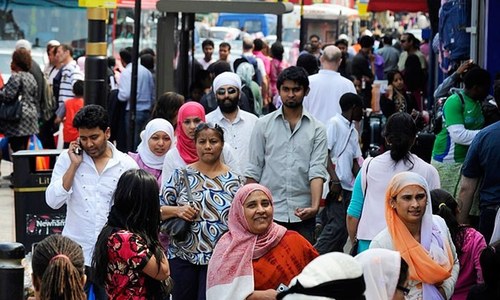LONDON: Britain’s decision to leave the European Union contributed to a sharp decline in the amount of workers’ remittances sent to Pakistan last month. Brexit caused a rapid fall in the value of sterling in international markets which, in turn, has reduced the value of money Pakistani beneficiaries are receiving from relatives in the UK.
The pound lost nine per cent against the dollar in the first two days after Brexit and has subsequently fallen further. Against the rupee it has fallen 13 per cent from Rs156 on June 23 when the vote took place to its current rate of around Rs135.
According to figures of the State Bank of Pakistan (SBP), $309 million was remitted from the UK to Pakistan in June this year. In July that fell to $143m.
But not all the decline was due to Brexit. Typically, remittances speed up before Eid and then slow down afterwards when banking facilities are not available.
“The decline in workers’ remittances during July 2016 is largely seasonal and attributed to the impact of Ramazan,” the SBP said in a statement.
According to SBP figures, remittances fell from $309 million in June to $143m last month
“This was further augmented due to extended closure of banking services during July 2016; for instance, banks were closed on 1st July and from 5th July to 8th July in Pakistan, whereas US banking system was closed on 4th, 9th and 10th July.”
The relative importance of the Brexit and Eid factors is hard to assess. “Brexit is certainly playing some role, but I think it is too early to pin this whole decline on the referendum result,” said Matt Colin of the Centre for Global Development.
Taking 2015 as a whole Pakistan received $1.4 billion from the UK and $1.1bn from the US. These figures are dwarfed by the $4.8bn that came from the UAE and $5bn from Saudi Arabia. In recent years remittance flows from the Middle East have risen more sharply than those from Western countries.
India receives far more remittances than Pakistan. In 2015 India’s $72bn total inflow compared with $20bn for Pakistan. The funds are a significant contribution to Pakistan’s GDP of $280bn.
The total remittances for Pakistan have been going up rapidly in recent years with some annual double-digit percentage increases being registered.
There is some evidence that migrants work harder when faced with a falling currency but their increased efforts are unlikely to make up the shortfall caused by such a marked devaluation as has been experienced in the UK. Furthermore, if there is a post-Brexit recession as some predict, that will further depress earnings and remittance flows.
Pro-Brexit ministers in the British government are yet to spell out in any detail what kind of break with the European Union they are hoping to achieve. One of the key issues is whether or not they will try to remain inside the single European market. Should they opt to leave the single market then it is likely that financial services companies in the city of London would lose their so-called passporting rights that enable them to operate freely across the EU.
That in turn will affect their capacity to offer remittance-related products to move money from the UK to EU member states.
Globally it is estimated that remittances are three times bigger than aid flows. For Pakistan, in line with many other developing countries, remittances are a far more valuable source of foreign exchange than aid money.
Not only are the volumes greater but remittances are generally a more reliable revenue stream. Aid budgets can be affected at short notice not only by sanctions but also by budgetary constraints in the donor country.
Published in Dawn, August 25th, 2016















































